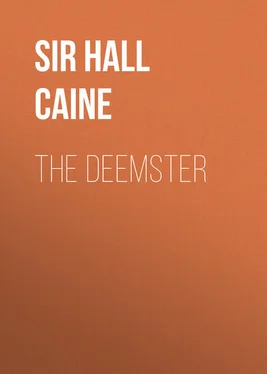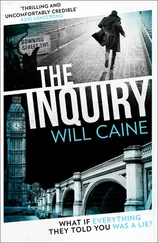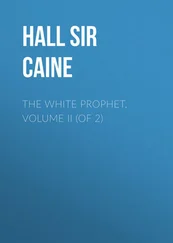Hall Caine - The Deemster
Здесь есть возможность читать онлайн «Hall Caine - The Deemster» — ознакомительный отрывок электронной книги совершенно бесплатно, а после прочтения отрывка купить полную версию. В некоторых случаях можно слушать аудио, скачать через торрент в формате fb2 и присутствует краткое содержание. ISBN: , Жанр: foreign_antique, foreign_prose, на английском языке. Описание произведения, (предисловие) а так же отзывы посетителей доступны на портале библиотеки ЛибКат.
- Название:The Deemster
- Автор:
- Жанр:
- Год:неизвестен
- ISBN:http://www.gutenberg.org/ebooks/35781
- Рейтинг книги:5 / 5. Голосов: 1
-
Избранное:Добавить в избранное
- Отзывы:
-
Ваша оценка:
- 100
- 1
- 2
- 3
- 4
- 5
The Deemster: краткое содержание, описание и аннотация
Предлагаем к чтению аннотацию, описание, краткое содержание или предисловие (зависит от того, что написал сам автор книги «The Deemster»). Если вы не нашли необходимую информацию о книге — напишите в комментариях, мы постараемся отыскать её.
The Deemster — читать онлайн ознакомительный отрывок
Ниже представлен текст книги, разбитый по страницам. Система сохранения места последней прочитанной страницы, позволяет с удобством читать онлайн бесплатно книгу «The Deemster», без необходимости каждый раз заново искать на чём Вы остановились. Поставьте закладку, и сможете в любой момент перейти на страницу, на которой закончили чтение.
Интервал:
Закладка:
Though a zealous upholder of Church authority, the Bishop was known to temper justice with mercy. He had not been a month in the diocese when his sumner told him a painful story of hard penance. A young girl from near Peeltown had been presented for incontinence, and with the partner of her crime she had been ordered to stand six Sundays at the door of six churches. The man, who was rich, had compounded with the Archdeacon, paying six pounds for exemption, and being thenceforward no more mentioned; but the woman, being penniless and appalled at the disgrace before her, had fled from the island. The Archdeacon had learned her whereabouts in England, and had written to the minister of the place to acquaint him that she was under the Church's censure. The minister, on his part, had laid before her the terror of her position if she died out of communion with God's people. She resisted all appeals until her time came, and then, in her travail, the force of the idea had worked upon her, and she could resist it no more. When she rose from bed she returned voluntarily to the island, with the sign of her shame at her breast, to undergo the penance of her crime. She had stood three Sundays at the doors of three churches, but her health was feeble, and she could scarcely carry her child, so weak was she, and so long the distances from her lodging in Peeltown. "Let her be pardoned the rest of her penance," said the Bishop. "The Church's censure was not passed on her to afflict her with overmuch shame or sorrow."
It was not until years afterward that the Bishop learned the full facts of the woman's case, and comprehended the terrible significance of her punishment. She was Mally Kerruish.
The island was in the province of York, and bound by the English canons, but the Bishop made his own canons, and none were heard to demur. Some of his judgments were strange, but all leaned toward the weaker side. A man named Quayle the Gyke, a blusterous fellow, a thorn in the side of every official within a radius of miles, died after a long illness, leaving nothing to a legitimate son who had nursed him affectionately. This seemed to the Bishop to be contrary to natural piety, and in the exercise of his authority he appointed the son an executor with the others. Quayle the younger lived, as we shall see, to return evil for the Bishop's good. A rich man of bad repute, Thormod Mylechreest, died intestate, leaving an illegitimate son. The Bishop ordered the ordinary to put aside a sum of money out of the estate for the maintenance and education of the child. But Thorkell came down in the name of the civil power, reversed the spiritual judgment, ordered that the whole belongings of the deceased should be confiscated to the Lord of the Isle, and left the base-begotten to charity. We shall also see that the bastard returned good for Thorkell's evil.
The canons and customs of Bishop Mylrea not only leaned – sometimes with too great indulgence – to the weaker side, but they supposed faith in the people by allowing a voluntary oath as evidence, and this made false swearing a terror. Except in the degree of superstition, he encouraged belief in all its forms. He trusted an oath implicitly, but no man ever heard him gainsay his yea or nay.
A hoary old dog known as Billy the Gawk, who had never worked within living memory, who lived, as they said, "on the houses," and frequented the pot-house with more than the regularity of religious observance, was not long in finding out that Bishop's Court had awakened from its protracted sleep. The Bishop had been abroad for his morning's ramble, and sitting on the sunny side of a high turf hedge looking vacantly out to sea, he heard footsteps on the road behind him, and then a dialogue, of which this is a brief summary:
"Going up to the Coort, eh? Ah, well, it's plenty that's there to take the edge off your stomach; plenty, plenty, and a rael welcome too."
"Ah, it's not the stomach that's bothering me. It's the narves, boy – the narves – and a drop of the rael stuff is worth a Jew's eye for studdying a man after a night of it, as the saying is."
"Aw, Billy, Billy – aw well, well, well."
The conversation died off on the Bishop's ear in a loud roystering laugh and a low gurgle as undertone.
Half an hour later Billy the Gawk stood before the Bishop inside the gates of Bishop's Court. The old dog's head hung low, his battered hat was over his eyes, and both his trembling hands leaned heavily on his thick blackthorn stick.
"And how do you live, my man?" asked the Bishop.
"I'm getting a bite here, and a sup there, and I've had terrible little but a bit o' barley bread since yesterday morning," said the Gawk.
"Poor man, that's hard fare," said the Bishop; "but mind you call here every day for the future."
Billy got a measure of corn worth sixpence, and went straightway to the village, where he sold it at the pot-house for as much liquor as could have been bought for three-halfpence. And as Billy the Gawk drank his drop of the real stuff he laughed very loud and boasted that he could outwit the Bishop. But the liquor got into his head, and from laughing he went on to swearing, and thence to fighting, until the innkeeper turned him out into the road, where, under the weight of his measure of corn taken in solution, Billy sank into a dead slumber. The Bishop chanced to take an evening walk that day, and he found his poor penisioner, who fared hard, lodged on a harder bed, and he had him picked up and carried into the house. Next morning, when Billy awoke and found where he was, and remembered what had occurred, an unaccustomed sensation took possession of him, and he stole away unobserved. The hoary old dog was never seen again at Bishop's Court.
But if Billy never came again his kith and kin came frequently. It became a jest that the Bishop kept the beggars from every house but his own, and that no one else could get a beggar.
He had a book, which he called his "Matricula Pauperum," in which he entered the names of his pensioners with notes of their circumstances. He knew all the bits of family history – when Jemmy Corkell's wife was down with lumbago, and when Robbie Quirk was to kill his little pig.
Billy the Gawk was not alone in thinking that he could outwit the Bishop. When the Bishop wanted a new pair of boots or a new coat, the tailor or shoemaker came to Bishop's Court, and was kept there until his job of work was finished. The first winter after his arrival in his Patmos, he wanted a cloak, and sent for Jabez Gawne, the sleek little fox who had been spokesman for the conspirators against James Quirk, the schoolmaster. Jabez had cut out the cloak, and was preparing it for a truly gorgeous adornment, when the Bishop ordered him to put merely a button and a loop on it to keep it together. Jabez thereupon dropped his cloth and held up his hands where he sat cross-legged on the kitchen dresser, and exclaimed, with every accent of aggrieved surprise:
"My Lord, what would become of the poor buttonmakers and their families if every one ordered his tailor in that way?"
"How so, Jabez?"
"Why, they would be starved outright."
"Do you say so, Jabez?"
"Yes, my Lord, I do."
"Then button it all over, Jabez," said the Bishop.
The Deemster was present at that interview, and went away from it tittering audibly.
"Give to the raven and he'll come again," he muttered.
"I forgot that poor Jabez would have his buttons in his breeches-pocket," said the Bishop.
The Manxman had not yet made up his mind concerning the composite character of Bishop Mylrea, his dignity and his humility, his reserve and his simplicity, when a great event settled for the Manxman's heart the problem that had been too much for his head. This was no less a catastrophe than a general famine. It came upon the island in the second year of the Bishop's residence, and was the cause of many changes. One of the changes was that the Bishop came to be regarded by his people with the reverence of Israel for Samuel, and by his brother, the Deemster, with the distrust, envy, and, at length, mingled fear and hatred of Saul for Israel's prophet.
Читать дальшеИнтервал:
Закладка:
Похожие книги на «The Deemster»
Представляем Вашему вниманию похожие книги на «The Deemster» списком для выбора. Мы отобрали схожую по названию и смыслу литературу в надежде предоставить читателям больше вариантов отыскать новые, интересные, ещё непрочитанные произведения.
Обсуждение, отзывы о книге «The Deemster» и просто собственные мнения читателей. Оставьте ваши комментарии, напишите, что Вы думаете о произведении, его смысле или главных героях. Укажите что конкретно понравилось, а что нет, и почему Вы так считаете.












